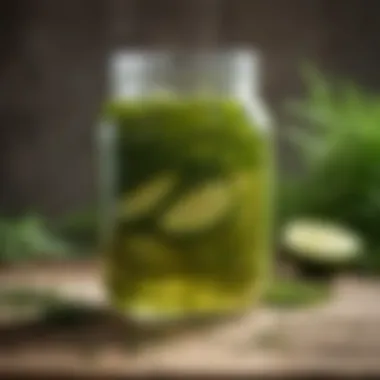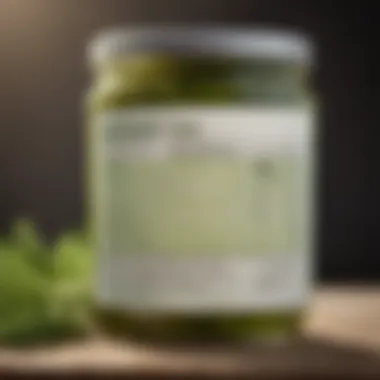The Surprising Health and Culinary Benefits of Dill Pickle Juice


Intro
Dill pickle juice is more than just the leftover liquid in your pickle jar. It holds a unique place in both culinary traditions and health discussions. This humble brine is packed with nutrients and offers several applications that many may overlook. From enhancing flavors in dishes to supporting recovery after exercise, dill pickle juice deserves a closer look. The exploration of its benefits reveals how this simple ingredient can elevate both health and culinary practices.
Recipe Overview
While dill pickle juice is often used in small quantities, its versatility can inspire a range of recipes. One popular application is as a marinade, which enhances the flavor of meats and vegetables. It also serves as an ingredient in cocktails, such as a classic pickleback shot.
Brief Description of the Dish
The simplicity of using dill pickle juice does not detract from its complexity of flavor. In marinades, it imparts a savory, tangy profile that transforms everyday dishes. In beverages, it adds an unexpected yet refreshing taste.
Key Ingredients
- Dill Pickle Juice: The main component, providing flavor and benefits.
- Olive Oil: For balancing the acidity of the pickle juice in marinades.
- Your Choice of Protein or Vegetables: Chicken, pork, or even tofu work well.
- Spices: Consider garlic powder, black pepper, or chili flakes for added flavor.
Preparation Guidelines
Preparing dishes with dill pickle juice is straightforward. Here is how to incorporate it into your culinary repertoire effectively.
Step-by-Step Instructions
- Select Ingredients: Choose your protein or vegetables.
- Mix Marinade: In a bowl, combine dill pickle juice with olive oil and spices of choice.
- Marinate: Place protein or vegetables in the marinade, ensuring they are fully coated. Marinate for at least 30 minutes, or longer for more intense flavor.
- Cook: Either grill, bake, or sauté your marinated ingredients until done to your liking.
- Serve: Enjoy your dish as a main course or side, enhanced by the tangy depth of dill pickle juice.
Preparation Tips and Tricks
- Experiment: Don't hesitate to try different vegetables or proteins. Each one reveals a new facet of flavor.
- Shorten Marination Time: If in a hurry, even a quick 10-minute soak can enhance the dish.
- Use in Drinks: A splash of dill pickle juice can elevate cocktails; give a Bloody Mary or a vodka tonic a zesty twist.
Dill pickle juice is not just a condiment; it’s a culinary staple that opens a world of possibilities.
Prelims to Dill Pickle Juice
Dill pickle juice is often relegated to the role of a simple condiment, used primarily as a briny addition to sandwiches or as a flavor enhancer in various dishes. However, it deserves a closer look due to its multifaceted benefits that range from nutrition to hydration. Understanding its significance is paramount in unlocking the full potential of this versatile brine. As people seek healthful alternatives in their diets, dill pickle juice emerges as a worthy candidate worth considering.
The natural ingredients in pickle juice, primarily vinegar, salt, and dill, provide a complex yet simple flavor profile that not only complements various foods but also adds significant value to dietary practices. Therefore, by delving into its historical background and nutritional profile, one can appreciate how this brine offers more than just a flavor punch.
Moreover, the increasing trend towards natural remedies and holistic health makes dill pickle juice an item that resonates with contemporary health-conscious consumers. As interest in functional foods grows, so does the relevance of exploring both the cultural significance and the scientific merits of dill pickle juice.
Historical Context and Cultural Significance
Historically, dill pickle juice can be traced back to ancient civilizations. The Egyptians are known to have utilized pickling for preserving food, while the Greeks and Romans valued the flavors and the health properties associated with fermented products. In addition, in many cultures, consuming pickle juice was seen as a ritualistic act promoting health and wellness.
In modern American culture, dill pickle juice gained popularity through its association with foods like pickles themselves. Some athletes started promoting it as a hydrating tonic after exercise, claiming it could help prevent muscle cramps. Today, this trend has evolved, finding a place not just in home kitchens but in gyms, cafes, and restaurants across the country. The historical significance of dill pickle juice illustrates its cultural relevance, making it more than just a simple condiment.
Nutritional Profile
The nutritional profile of dill pickle juice is noteworthy. It typically contains water, vinegar, salt, and several spices, giving it a unique structure of nutrients. Here are the key components:
- Electrolytes: Dill pickle juice is rich in sodium, an essential electrolyte that aids in maintaining hydration. This is particularly useful for those who engage in strenuous activities.
- Vitamins and Minerals: It may contain trace amounts of vitamins such as Vitamin K and minerals like calcium and magnesium, depending on the recipe used.
- Low Caloric Count: Most versions of pickle juice have a low calorie content, making them a suitable option for these watching their caloric intake.
Thus, incorporating dill pickle juice into one’s diet can enhance nutritional value, providing both hydration and essential nutrients needed for good health.
Hydration and Electrolyte Balance


Hydration is crucial for overall health and athletic performance. Electrolyte balance, in particular, plays a vital role in maintaining bodily functions. Dill pickle juice, with its unique composition, emerges as an intriguing option for hydration. The high sodium content in dill pickle juice can help replenish lost electrolytes, particularly after strenuous exercise.
Role in Post-Workout Recovery
After intense physical activity, the body goes through a recovery phase, where it needs to restore fluid and electrolyte balance. Dill pickle juice is gaining attention for being effective in this respect. Many athletes are starting to consider it as an alternative to sports drinks. The reason lies in its benefits. The sodium and potassium in pickle juice aid in hydration and help restore the body’s electrolyte levels.
Research indicates that consuming a few ounces of dill pickle juice can reduce muscle soreness and speed up recovery time. Some studies suggest that the vinegar content also contributes to recovery. Acidic drinks can positively influence the biochemical environment of the body post-exercise, potentially enhancing recovery.
Prevention of Muscle Cramps
Muscle cramps can be a significant hindrance during and after workouts. Dill pickle juice may help alleviate this issue. It is believed that the combination of vinegar and salt can help reduce the incidence of cramps. The sodium can balance fluids in the body, while vinegar enhances acid-base regulation.
Athletes often consume a small amount of pickle juice when they feel cramps coming on. This practice has anecdotal backing, with many claiming immediate relief. Some studies support these claims, showing that individuals who drink pickle juice can experience a reduction in the duration of cramps. This aspect makes dill pickle juice an appealing option for those engaged in rigorous physical activities.
"Dill pickle juice may provide a simple, effective solution for hydration and cramp prevention during workouts."
Health Benefits of Dill Pickle Juice
Dill pickle juice often does not receive the recognition it deserves for its potential health benefits. This section explores how dill pickle juice contributes to various health aspects. Its composition plays a role in hydration, recovery, and even blood sugar management. Understanding these benefits can help individuals make informed decisions about incorporating it into their diet.
Potential Antioxidant Properties
The antioxidant properties of dill pickle juice are noteworthy. Antioxidants are known to combat oxidative stress in the body. This stress can contribute to chronic diseases. Dill pickle juice contains compounds like polyphenols that may offer protective effects. While research is still developing, including antioxidant-rich foods in one’s diet is generally considered a good practice. Pickle juice may not be a primary source, but it does add value when consumed alongside other nutrient-rich foods.
Impact on Blood Sugar Levels
Another significant benefit of dill pickle juice is its impact on blood sugar levels. Studies suggest that vinegar, a key ingredient, can improve insulin sensitivity. This can help regulate blood glucose. The acetic acid found in the juice plays a role in slowing down carbohydrate digestion. For individuals who have blood sugar concerns, integrating dill pickle juice into meals could serve as a natural aid. It supports a balanced approach to blood sugar management, especially when included in a meal context.
Role in Digestive Health
Dill pickle juice also offers advantages when it comes to digestive health. The unique ingredients within the juice contribute to gut function and overall digestion. It promotes a healthy gut environment when included in a balanced diet. Let's take a look at the specific aspects that aid in digestive health.
Probiotic Content
The probiotic elements in dill pickle juice are essential in promoting gut health. Probiotics are live bacteria that benefit the digestive system. They help maintain a balanced microbiome and can improve digestion. The fermentation process used in making dill pickles enhances these beneficial properties. Adding dill pickle juice to one's diet can be a simple way to introduce probiotics. This inclusion supports a diverse gut flora, which is linked to better health.
Support for Gut Health
Support for gut health ensures that the digestive system functions optimally. Dill pickle juice is often considered a natural remedy for digestive discomfort. Its acidic nature aids in the digestion process. Consuming it may assist in breaking down food more effectively. This unique feature is particularly beneficial for those who experience sluggish digestion.
"Incorporating dill pickle juice into your meals may enhance digestive functionality and balance gut bacteria."
By acknowledging these benefits of dill pickle juice, individuals can explore its role in fostering better health. Understanding its components provides a clearer picture of how it contributes to dietary needs.
Dietary Uses of Dill Pickle Juice
Dill pickle juice has emerged as a noteworthy component in discussions about dietary uses. Its unique properties and potential health benefits make it a fascinating ingredient. Many individuals are exploring ways to incorporate it into their diets not just for flavor enhancement, but also for its believed health advantages.
The role of dill pickle juice in various dietary approaches provides specific elements that cater to health-conscious diets. People concerned with weight management or specific dietary restrictions find dill pickle juice advantageous. Furthermore, it introduces valuable flavor without excessive calories or artificial ingredients, making it an age-appropriate addition.
Incorporation in Weight Loss Diets
Weight loss diets often emphasize low-calorie but flavorful options. Dill pickle juice can be a part of this. It naturally contains minimal calories but possesses bold flavors. This characteristic allows it to enhance meals without adding significant caloric load.


Moreover, the acidity may promote satiety, helping individuals feel fuller faster. This small consideration can lead to less overeating during meals. Some suggest drinking a shot of pickle juice before meals could also contribute to less overall food intake. However, more research is needed to back these claims.
Used in Various Dietary Restrictions
Keto Diet
The Keto Diet is popular for its focus on low carbohydrates. Dill pickle juice aligns well with this plan. It is low in carbs and can be used to flavor dishes without disrupting ketosis.
Key characteristic: The Keto Diet aims to induce a metabolic state called ketosis, which can promote fat burning. Dill pickle juice contributes to this by providing flavor while staying within carb limits.
Unique feature: Its acidity can enhance palate satisfaction, making meals more enjoyable. This can be particularly useful when preparing otherwise bland meals, which is common in a strict Keto Plan. However, sodium content is something to watch out for in excess.
Paleo Lifestyle
The Paleo Lifestyle is built on consuming whole foods that early humans might have eaten. Dill pickle juice meets this guideline, as long as it’s made from natural ingredients without preservatives.
Key characteristic: The focus is on unprocessed foods. Dill pickle juice fits in as a natural product that can add flavor and support digestive health.
Unique feature: It can be used to pickle other vegetables, thus following the preservation methods used in the Paleo era. However, careful selection of brands is necessary to ensure they comply with Paleo principles.
Vegan Considerations
For those following a Vegan diet, dill pickle juice serves as a versatile ingredient. It is plant-based and can be used in countless recipes.
Key characteristic: Vegan diets focus on excluding all animal products. Dill pickle juice offers a way to enhance flavor without using any animal-derived ingredients.
Unique feature: It is often used to add depth to salads, sauces, and marinades. However, vegans should still check product labels to ensure no hidden animal-derived additives are present in commercially sold options.
Dill pickle juice is not just a condiment but a valuable component in various dietary frameworks.
Culinary Applications
Culinary applications of dill pickle juice extend its usability beyond a mere condiment. This versatile liquid enhances flavors and adds a unique profile to a variety of dishes. Understanding the role of dill pickle juice in culinary practices can enrich both home cooking and professional kitchens. It is not just about flavoring; it encompasses health benefits and innovative cooking techniques.
Marinade and Dressing Ingredient
Dill pickle juice serves as an excellent marinade and dressing ingredient. Its tangy flavor profile can tenderize meat while adding zesty notes. This makes it an ideal option for marinating chicken, pork, or even vegetables. The acid content in the juice helps break down proteins, allowing for a more flavorful and tender texture.
Salads also benefit from the incorporation of dill pickle juice as a dressing. Mixing it with olive oil and herbs can result in a fresh and lively dressing that enhances various salad ingredients. The balance of tartness and richness leads to an intriguing combination that appeals to many palates.
Innovative Culinary Techniques
Pickling Other Foods
Pickling other foods using dill pickle juice is a popular technique that expands its culinary realm. The process of pickling adds depth to a variety of vegetables, from carrots to radishes. This method not only preserves the food but also infuses them with the distinct taste of dill and vinegar. The characteristic sharpness becomes a hallmark feature, making these pickled items great companions to sandwiches, tacos, or as standalone snacks.
One advantage of this technique is that it allows for experimentation with different vegetables, enabling cooks to tailor the flavors to their preference. This flexibility makes it appealing for those seeking to explore tastes in a fun and engaging way. However, it is essential to note that over-pickling can lead to overpowering flavors, which may not suit every dish.
Infusing Flavor into Dishes
Infusing flavor into dishes is another key application of dill pickle juice. By integrating this brine into cooking processes, chefs can elevate the taste of both traditional and modern recipes. For instance, adding it to potato salads or sauces can result in a layered flavor experience. The unique sourness enhances the overall dish while adding complexity.
This technique is beneficial as it provides a quick way to boost taste without the need for extensive preparation. A small amount can transform the mundane into something interesting. However, controlling the quantity used is crucial, as excessive dill pickle juice can dominate the other flavors, which might not be desirable in every preparation.


"Dill pickle juice in culinary trends is not just a fad; it's a rediscovery of flavors and health benefits that have long been overlooked."
Modern Trends and Cultural Phenomena
Dill pickle juice is no longer just a forgotten condiment found at the back of kitchen cupboards. Today, it has emerged into modern food culture as a trendy ingredient with various applications. The exploration of dill pickle juice in contemporary culinary practices reveals how flavors and nutrition intertwine. Understanding these trends provides insight into why this simple brine has garnered renewed attention.
The Popularity of Pickle-Flavored Products
The resurgence of pickle-flavored products in recent years stems from the growing interest in bold and unexpected flavors. Items such as pickle-flavored chips, popcorn, and even ice cream have captivated consumers, especially those seeking novelty in their snacks. This popularity can be attributed to a few key factors:
- Nostalgia: Pickles often evoke childhood memories. Many people associate them with summer picnics and family gatherings, creating a sense of comfort.
- Curiosity: Food innovation is at an all-time high. Consumers are eager to try unique flavors, and pickles provide an exciting option.
- Health Consciousness: Given the health benefits of dill pickle juice, many are seeking products that not only taste good but also support a healthy lifestyle.
These factors contribute to the expanded market for dill pickle-flavored items.
Social Media Influence on Culinary Practices
Social media platforms have a significant impact on food trends and dietary practices today. Dill pickle juice has found a place in this digital discourse, largely due to the following:
- Content Creation: High-quality images and innovative recipes featuring dill pickle juice circulate online, inspiring users to experiment. Influencers and food bloggers highlight its versatility.
- Community Engagement: Social platforms allow food lovers to share their experiences, create challenges, and engage in conversations about flavors and health. Recipes and cooking techniques are shared widely, increasing accessibility.
- Viral Trends: Trends can become viral sensations overnight. Dill pickle juice-based drinks or recipes can gain considerable traction through shares and likes, encouraging more people to try this ingredient.
"Social media serves as a realm that enhances culinary exploration, making ingredients like dill pickle juice appealing to a broader audience."
Through the analysis of these modern trends, it's clear that dill pickle juice is more than just a food product; it is part of a cultural phenomenon that marries tradition and innovation, appealing to diverse audiences.
Considerations and Precautions
Sodium Content and Health Risks
One of the primary concerns regarding dill pickle juice is its sodium content. Typically, pickle juice is high in salt, which can pose health risks when consumed in excess. High sodium intake is linked to various issues, such as hypertension and cardiovascular diseases.
For those who need to monitor their sodium intake, perhaps due to applicable medical conditions or dietary guidelines, it is prudent to review labels when selecting pickle juice or pickles. The amount of sodium can vary significantly between brands. On average, a single serving may contain anywhere from 500 to 1,100 milligrams of sodium.
Key considerations include:
- Daily recommended limit: The American Heart Association recommends no more than 2,300 mg of sodium a day, with an ideal target of no more than 1,500 mg for most adults.
- Potential effects of overconsumption: Excessive sodium can lead to water retention, increased blood pressure, and strain on the kidneys.
- Balanced approach: It’s advisable to enjoy dill pickle juice in moderation as part of a balanced diet that considers your overall sodium intake from other food sources.
Potential Allergies and Sensitivities
Another important aspect to consider is the possibility of allergies and sensitivities associated with dill pickle juice. While many people enjoy this brine without any issues, some individuals may experience adverse reactions.
It is crucial to be aware of the ingredients in dill pickle juice, as they can vary. Common allergens may include:
- Vinegar: Some may react to the acetic acid in vinegar, leading to digestive discomfort.
- Spices and additives: Additional herbs or preservatives can also trigger allergies in sensitive individuals.
- Intolerance: Individuals who experience gastrointestinal distress after consuming fermented foods may find that they cannot tolerate pickle juice, as it is a fermented product.
Closure
Summary of Benefits and Culinary Uses
Dill pickle juice boasts several notable health advantages that merit attention. Its keter loaned from vital elements like potassium and magnesium contributes to maintaining electrolyte balance, especially post-exercise. People who practice intense physical activities have turned to dill pickle juice as a natural remedy for muscle cramps, benefiting from its ability to rehydrate and replenish lost minerals.
Furthermore, the juice is known for its possible health benefits, such as aiding digestion. The presence of vinegar can promote stomach acidity and support digestive enzymes. Additionally, dill pickle juice has antioxidant properties which may help combat oxidative stress in the body.
Culinary applications of dill pickle juice extend beyond mere consumption as a drink. Its sharp tang can be incorporated into marinades, salad dressings, and even as an ingredient for pickling other vegetables. Chefs and home cooks alike may find inspiration in using it as a flavor enhancer in various dishes, from roasted meats to potato salads.
Future Research Directions
Although current understanding of dill pickle juice’s benefits is growing, there remains much to explore. Future research could delve deeper into specific health claims, such as the effects on metabolic health or gut microbiome balance. Clinical trials may be valuable in establishing evidence-based recommendations for its use in specific populations, especially athletes or those managing chronic conditions.
Moreover, studies could focus on how integrating dill pickle juice into everyday meals can influence dietary habits. Understanding the cultural significance and the varying ways it is utilized across cuisines can also provide a richer context for its benefits.
Overall, as culinary trends evolve, dill pickle juice can be a focal point for future exploration, both in culinary settings and nutritional science.







